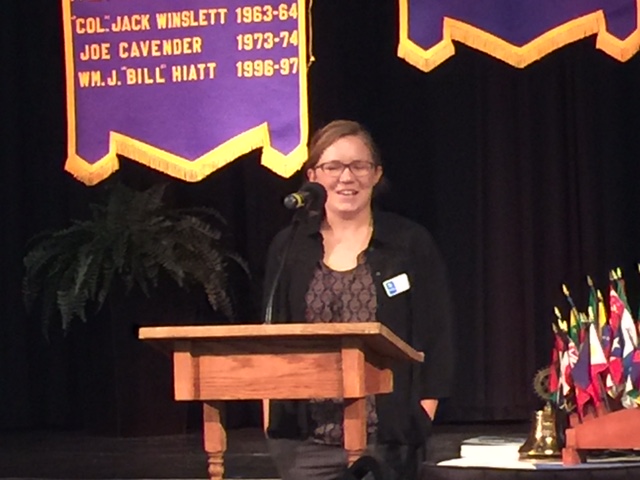North Notes
Spokane North Rotary Club Bulletin
August 7, 2017
Briefs:
Mr. President: Chad Haverkamp, our 2017-18 Rotary Club leader, is the luncheon speaker Aug. 14. Hopefully all of our members can join us.
Mr. District Governor-emeritus: Thanks to a nice long visit with Dave Hayward, Bill Hiatt, the last District Governor from Spokane North -- about 20 years ago—shared memories and martinis at her home. Bill, now 85, said he would try to visit a future luncheon meeting.
‘H’ is for homes, Habitat and Humanity
If you have seen a Gonzaga University basketball team in the past few years, you have seen one of the most visible former student Zag, Angie Funnell.
 But don’t scour recent rosters for Angie. She was “Spike,” the GU Bulldog mascot who helped the teams move toward their Zags’ winning ways.
But don’t scour recent rosters for Angie. She was “Spike,” the GU Bulldog mascot who helped the teams move toward their Zags’ winning ways. Now Angie is cheering for another team – Habitat for Humanity Spokane. Funnell, Habitat’s fund development and marketing director, visited Aug. 7 to share about program details. (Also while at GU, Angie was a mentor at Holmes Elementary School.)
Angie showed pictures of shanty towns in Columbia, her native South Africa, and even in Spokane. She said Spokane has been a welcomed change from the poverty and Apartheid difficulties with violence and crime, occasionally including times when she was held at gunpoint.
So helping low-income families helping to buy their first home-building experience has been most worthwhile, she said.
Habitat for Humanity operates in 70 countries, working with the motto “people’s God love into action.” The global agency states that some 100 million people are homeless world-wide, and 1.6 billion people lack adequate housing.
Making a small dent here in those statistics, Habitat builds new homes and rehabs older houses.
Funnell said the largest enterprise in Spokane County is Hope Meadows, a 20-acre site for up to 114 houses in Deer Park. That development has already built 30 homes, with average price-points at about $150,000 each on three plan designs which can accommodate couples up to nine residents.
Since 1987, Habitat has built 270 homes. Members of Spokane North Rotary have worked on at least one Habitat house several years ago. Angie said the new homes are “built green,” as “stable and sustained.” Radiant flooring, she said, means that even in Deer Park’s “snow belt” the houses are warm and often less than $40 a month for heating.
“We don’t have granite countertops, but our buildings have high standards,” she said.
“We build homes with partners; we don’t give houses away,” Funnell said, adding that Habitat prefers “future home owners” than “partners.”
Participants work with detailed education plans on how to care and manage the units, as most in the program are first time home-buyers. Each family must contribute 500 hours in “sweat equity” in the program.
Homes are landscaped and are helped with house repair programs. Angie said no one in the Spokane project has been evicted for poor maintenance.
Home buyers can finance houses with zero-interest, 20-year or 30-year mortgages. If someone leaves the home, the house is refinanced with a new recruited family and a new mortgage.
Funnell said though the Deer Park is a ways out for many job-seekers, because of the lower building rates, several Habitat families have been able to buy vehicles, also a first for many in the program.
Habitat operates a store on east Trent and asks for in-kind and donated funds. Typical are a “box of nails” for $35, an $85 “exterior window,” or a $150 “door.” There also are monthly contributions with job titles, such as $25 for an “apprentice,” $50, for a “journeyman,” $500 for a “builder” and $1,000 a month for “developer.”
Some volunteers work one day a week at Habitat; others schedule annual visits. During “blitz build” programs, four houses are completed in just 11 days, she said.
Funnell said qualified Habitat recruits typically are in the 25-60 percent Area Median Income area – usually $15,000-$21,000 a year.
As much as 60 percent can be refugee or immigrant descent, with about 22 percent homeless and 24 percent with medical or physical disabilities.
And, if Angie wants to don a mascot for Habitat, she might use another motto the agency uses: “Through shelter, we empower.”
The bulletin producers:
Bulletin editors: Chuck Rehberg and Sandy Fink
Photo: Sandy Fink
Program coordinator: Brad Stark
